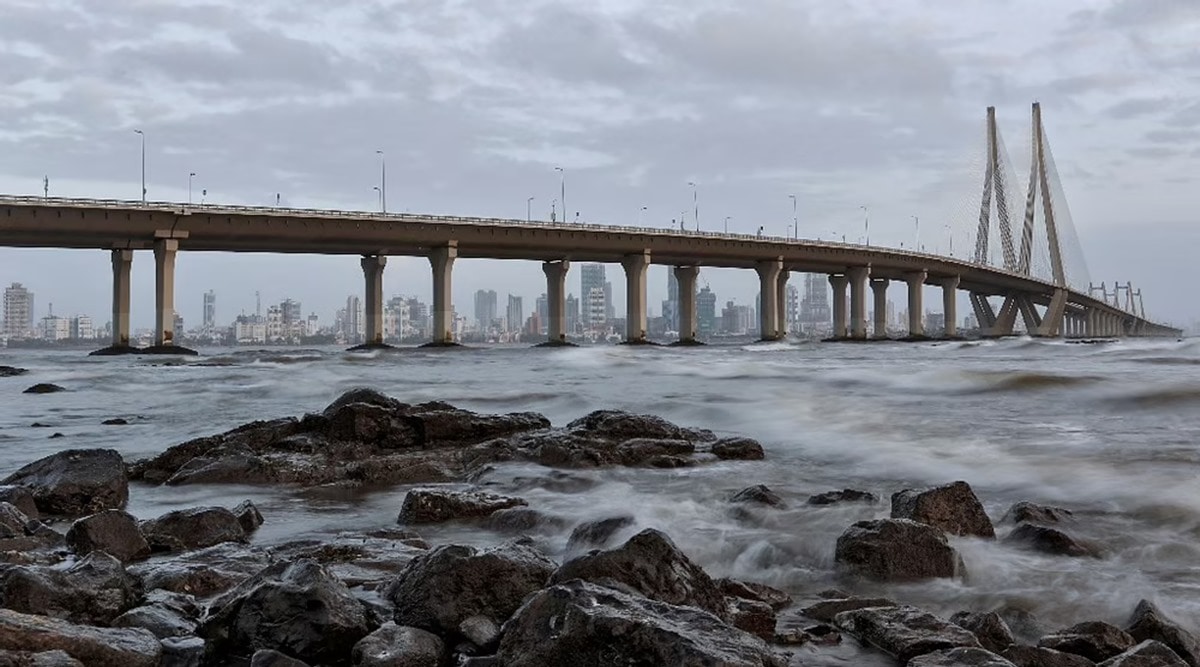 The civic body’s Sewerage Operation department monitors marine outfalls at Colaba, Worli and Bandra (File)
The civic body’s Sewerage Operation department monitors marine outfalls at Colaba, Worli and Bandra (File)Bacteria count along Mumbai’s coastline is decreasing gradually but remains way above the permissible limits. The Brihanmumbai Municipal Corporation’s recent Environment Status Report (ESR), 2019-20, states that E coli (or Escherichia coli), which can cause anything from dysentery to meningitis if ingested, continues to have a high count along the city’s coastline.
While a safe E coli count is 100 colony forming units (CFU) per 100 millilitres (ml) of water, in Bandra the bacteria has been recorded at 500 CFU — the highest in the city. Last year, it was recorded at 400 CFU in the area. In Worli, which recorded 540 CFU last year, E coli count stands at 310 CFU this year. Colaba has 150 CFU E coli as compared to 300 CFU recorded last year.
Y B Sontakke, the Joint Director of Maharashtra Pollution Control Board (MPCB), said, “The level of E coli is high because of untreated sewage. As a regulatory body, we usually communicate with the BMC and direct them to comply with norms.”
Sewage treatment and effects on waterbodies
Mumbai’s poor sewage treatment has played a major role in turning its rivers into nullahs over the years with one of its most important and longest rivers, Mithi, facing the worst water degradation. While the city expanded over the years, sewage treatment continued to remain a huge challenge for the Brihanmumbai Municipal Corporation. A city with a population of 1.24 crore, discharges its 60 to 70 per cent sewage into rivers, creeks and sea without proper treatment. At many areas, residential colonies and industries directly discharge their effluent into the Mithi. Already running behind its 2015 schedule for completing the upgrade of its seven sewage treatment plants (STPs), the civic body’s negligence and changing discharge norms have also hit the project badly.
According to city-based environmentalist Stalin D, the presence of E coli bacteria will impact the water quality of the entire shoreline and even contaminate seafood. “People who consume seafood can get sick. While swimming in such water can cause skin infections, accidental drinking could lead to bacterial illnesses,” Stalin said. The other parameters to check water quality include pH, biochemical oxygen demand, dissolved oxygen and turbidity. According to BMC data, except E Coli all the other parameters are within the prescribed standards.
The civic body’s Sewerage Operation (SO) department monitors marine outfalls at Colaba, Worli and Bandra — all three are primary-level sewerage treatment plants — to keep a check on seawater quality. Random water samples are collected in the one-kilometre periphery from these outfall disposal points throughout the year and the samples are matched with the MPCB prescribed standards for seawater quality under SW-II category. As per the water quality standards for coastal waters marine outfalls, SW-II is designated as best used for bathing, contact water sports and commercial fishing.
A marine outfall is a pipeline or tunnel that discharges municipal wastewater from water desalination plants to the sea.
Discharge of untreated sewage, civic officials said, is one of the main reasons for a high presence of E coli as human and animal excreta has faecal coliform bacteria.
The BMC had recently floated tenders for reconstructing and upgrading STPs at seven locations. “There is a delay in construction work due to a change in discharge norms. Last year, when we were in the process of appointing contractors for the project, the National Green Tribunal (NGT) ordered us to change the norms of discharge. We had to cancel the tenders and re-invite it. Now, these STPs will be made with more stringent norms and treated sewage can be reused for non-potable purposes,” a senior officer from Mumbai Sewage Disposal Project department said. Mumbai generates over 2,700 million litre sewage water daily and all seven STPs perform only primary treatment before discharging it into the sea. Many parts of the city do not have sewerage networks, so they directly discharge raw sewage in water bodies, like the Mithi river.
📣 The Indian Express is now on Telegram. Click here to join our channel (@indianexpress) and stay updated with the latest headlines
For all the latest Mumbai News, download Indian Express App.